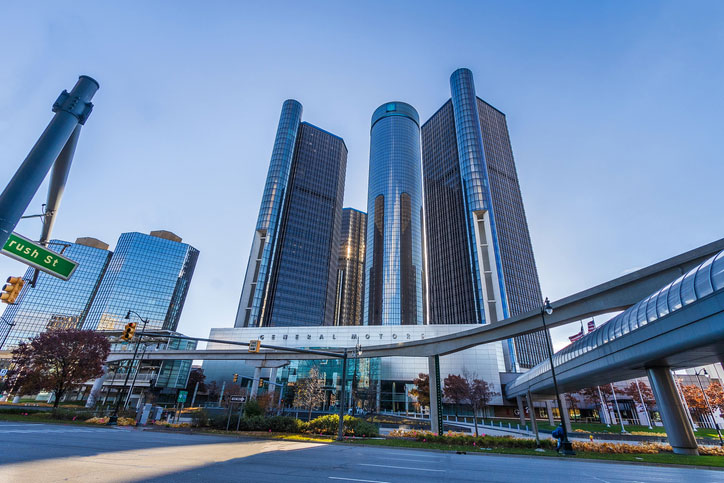Created by Ai Contributing Writer

When it comes to AI, the media likes to focus on headlines that get clicks. In the meantime however, Detroit has been quietly becoming the region’s AI leader. When measured by the amount of AI and ML patents filed, Detroit ranks in the top-10 nationally among all metro areas, with 896 issued in the Detroit-Warren-Dearborn region since 2010.
This is thanks in large part to the automotive industry, on top of a thriving tech startup scene in Detroit. Combined, these factors are enough for the Motor City to outrank even Chicago.
In fact, companies like Google recognize that Michigan’s unique situation as an auto manufacturing powerhouse make it an inevitable hub for autonomous vehicle research and development. As self-driving vehicles are slated to revolutionize the entire transportation industry, state, city, and private sector leaders in Michigan are all betting on this, and they’re supporting the AI infrastructure and brain trust that’s necessary to make it happen.
And this is all in addition to other sectors that AI is in the midst of revolutionizing, from medicine, to engineering to energy, to name just a few.





If you’re looking to ride this wave, you’ll find that a graduate degree or post-degree certificate in AI is the universally-accepted common currency for the jobs of tomorrow right here in Michigan.
Michigan Central in Detroit is a New Startup Hub with Huge Backers
 The story of the old Michigan Central train station in Detroit’s Corktown couldn’t be more symbolic of the city’s own history. When it was completed in the early part of the 20th century, it was one of the grandest stations of its time, connecting the boom-town of Detroit to the rest of the nation as the invention of the automobile took the nation by storm.
The story of the old Michigan Central train station in Detroit’s Corktown couldn’t be more symbolic of the city’s own history. When it was completed in the early part of the 20th century, it was one of the grandest stations of its time, connecting the boom-town of Detroit to the rest of the nation as the invention of the automobile took the nation by storm.
Manufacturing materials arrived by rail, and newly-minted cars left the same way. However with globalization in the latter half of the 20th century Michigan’s auto manufacturing base gradually declined, and by 1988 the Rust Belt’s most iconic train station was officially abandoned.
Michigan Central sat as a derelict building for 30 years until Ford bought it in 2018. A new generation had big plans for the central station complex, and Detroit’s nascent but steadily-growing tech scene provided the innovative spark to jump-start a renaissance.
Ford, Google, the State of Michigan, and the City of Detroit were early backers of the plan to transform the old 30-acre central station complex into an image of what America’s future cities will look like.
Their vision sees cutting-edge startups, industry experts, leading academics, and community leaders joining together to create a space that’s sustainable, accessible, and that addresses the most pressing societal challenges. Their vision was for a tech-community-green-innovative hub that occupies Michigan Central, and that vision has just recently become a reality.
Mobility is a major theme of this renovation project. Autonomous vehicles and robots feature prominently throughout the complex, which began opening up some of its 1.2-million square feet of office space in mid-2023.
Newlab is one of the first tenants on the greater Michigan Central campus. It’s an umbrella incubator that creates maker space for over 250 deep tech startups complete with more than 1,000 entrepreneurs. When it comes to mobility, Newlab’s AI professionals are involved in projects in areas like logistics, electrification, urban infrastructure, and sustainable fuels.
Dozens more companies already call the Michigan Central campus home and many more have dibs on office space as soon as all renovations are complete. Names that are already associated with the complex include:
- Engineering, design, and consulting company SME
- Smart road developer Cavnue
- Resurget Engineering, specializing in structural and specialty design and consulting
Michigan Central symbolizes the past and present. Today it’s also representing a prosperous and equitable future as Detroit attracts the best minds in tech startups and AI.
AI Jobs in Michigan
The US Department of Labor, Bureau of Labor Statistics (BLS) reports that between 2020 and 2030 the number of AI jobs (classified by BLS as computer and information research scientists) is projected to increase by 18% in Michigan.
That news may be alarming to some. A new paradigm will undoubtedly shake up the status quo, and those who fear change inevitably sound the alarm. But it need not be so, says an assistant professor of business policy and strategy at the University of Michigan-Dearborn.
As Dr. Helet Botha explains, AI will certainly be taking over more mundane and repetitive work. But that just leaves more creative and challenging work for the humans.
Throughout Michigan many companies are already rolling out AI solutions, and that means they need skilled professionals with graduate degrees and post-degree certificates in AI to fill these new jobs.
Artificial Intelligence Jobs in Metro Detroit
According to the US Bureau of Labor Statistics, approximately 240 AI professionals (classified by BLS as computer and information research scientists) worked throughout Michigan in 2022. The Detroit metro area was home to half of these jobs, while Ann Arbor was home to approximately 29%.
Newlab, a major force within Detroit’s Michigan Central project, needs AI professionals who hail from all types of backgrounds. Its current projects include autonomous boating, aerial drones, and autonomous cars. The talent pool that supports these projects will have experience with machine learning based on sensory inputs.
Soothsayer Analytics has a global presence although its headquarters is in Livonia. It offers AI solutions tailored to the unique needs of business clients’ in different sectors. After consulting with clients SA’s AI professionals are then tasked with creating solutions based on predictive analytics, pattern recognition, optimization, text analytics, image recognition, and the IoT.
AI professionals interested in autonomous driving, e-mobility, communication systems, rail, energy, marine, and aerospace would do well to check out dSPACE. This is a company with global locations, whose sole North American presence is in the Detroit suburb of Wixom. In addition to IRL applications, dSPACE specializes in creating accurate simulations.
Livonia-based Trinity Health manages hospitals across the country. TH Michigan operates nine major healthcare facilities throughout the state. As technology improves leadership at TH finds itself in a similar position as their counterparts across Michigan’s entire healthcare industry; they’re tasked with improving efficiency. Of late this means hiring AI professionals to leverage skills like language processing, predictive analytics, and machine learning to uncover hidden data insights that speeds things along and identifies opportunities for automation.
AI Companies in Metro Detroit
Advancements in industries like self-driving vehicles and networked smart cars are a perfect fit for a state like Michigan, and they’re instrumental in driving up demand for AI jobs.
Automation is also a lightning rod for the latest AI developments, and few major industries are as spectacularly automated as vehicle manufacturing. AI and ML patents filed by Ford and GM account for nearly 70% of the industry’s total since 2010. In addition to major automakers there are also adjacent companies that serve the broader industry, and others:
- The company Aurora, with an office in Detroit, is a leader when it comes to developing autonomous transportation, concentrating right now on robotaxis and autonomous trucking. AI and machine learning will be critical components in the future of driverless vehicles.
- Waymark is a Detroit-based advertising company that boasts the distinction of making the world’s first natural language video creation platform. That’s right: it makes video ads for corporate clients starring an AI-generated cast.
- Neurologists at Detroit Medical Center are currently relying on AI tools that are trained on image recognition to improve the diagnosis of stroke warning signs. One program they use scans images for major risk factors like large vessel occlusions in the brain and then notifies doctors of red flags.
AI Salary in Detroit and Ann Arbor
The US Bureau of Labor Statics reports that as of 2022 the average annual salary for AI professionals (classified by BLS as computer and information research scientists) is $126,030 in Michigan.
The Detroit metro area’s average is well above this at $138,190, while Ann Arbor’s mean salary in this category is $114,810.
Represented by 2022 BLS stats for computer and information research scientists in the 90th percentile, AI professionals in Michigan who are at the top of their game earn:
- Statewide – $172,040
- Detroit metro area – $172,040
- Ann Arbor – $168,500
Artificial Intelligence and Machine Learning Master’s Degree and Certificate Courses in Michigan and Online
Given Detroit’s advancements in AI, it should come as no surprise that several options for AI degrees are currently available throughout the state, with more on the way.
Lawrence Technological University in Southfield and the University of Michigan-Dearborn both offer a ton of appealing options at the graduate and undergraduate levels. Wayne State University in Detroit also offers several graduate study AI options. Additionally, Michigan State University in East Lansing offers generative AI as an option for research topics.
You’ll find online, hybrid, and on-campus options when it comes to completing your AI-focused education in-state. If you’re looking for options nationally there’s no shortage of online and out-of-state AI options with private and public universities.
Machine Learning Degree and Certificate Options in Dearborn
Machine learning will be key as Detroit’s startup scene focuses on autonomous vehicles. The University of Michigan-Dearborn offers an MS degree in artificial intelligence with a concentration in machine learning. It also offers an MS in data science with a computational intelligence specialization.
AI Robotics Degree and Certificate Options in Southfield and Dearborn
Over the past two decades robotics has been a defining feature of Michigan’s automobile manufacturing industry. It’s also an area of focus for Michigan Central’s Newlab.
Lawrence Technological University hosts an MS in AI degree with an option to specialize in robotics and sensors. The University of Michigan-Dearborn offers an MS degree in AI with a concentration in intelligent interaction.
AI Computer Science Degree and Certificate Options in Southfield and Detroit
CS is the scaffold that underpins further study into the intricacies of AI and machine learning.
Lawrence Technological University has an MS degree in computer science with a concentration in intelligent systems. At the undergraduate level, it also hosts a BS in computer science with a concentration in artificial intelligence.
Wayne State University offers an MS degree in computer science with an AI concentration.
AI Engineering Degree and Certificate Options in Dearborn
Engineering is the bridge between AI software and real-world applications. Ask anyone who works at Soothsayer Analytics in Livonia.
Lawrence Technological University
College of Arts and Sciences
Southfield, MI
Website

MS in AI (on-campus)
Offered with options to specialize in:
- Connected Vehicles
- Data Science
- Robotics and Sensors
- Cybersecurity
Also offers:
- BS in Computer Science-AI concentration
- MS in Computer Science-Intelligent System
Total Estimated Program Cost: $33,600
Only private AI master’s degree in Michigan.
University of Michigan-Dearborn (Public)
College of Engineering and Computer Science
Dearborn, MI
Website

MS in AI (online, on-campus, hybrid)
Concentrations:
- Computer Vision
- Machine Learning
- Knowledge Management and Reasoning
- Intelligence Interaction
Also offers:
- Minor in AI
- Graduate Certificate in Intelligent Systems in Engineering Applications
- MS in Data Science-Computational Intelligence Specialization
Total Estimated Program Cost: $27,270 ($1,640 per-credit out-of-state)
2022 US Bureau of Labor Statistics salary figures for computer information and research scientists. Job growth projections from the US Department of Labor-sponsored resource, CareerOneStop. Figures are based on state data, not school-specific information. Conditions in your area may vary. Data accessed October 2023.






